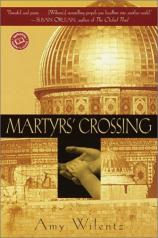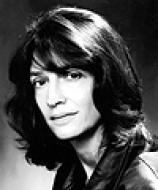Martyrs' Crossing
Review
Martyrs' Crossing
MARTYRS' CROSSING, Amy Wilentz's first novel, is distressingly timely in its release. Arab-Israeli strife is back with a vengeance. Israel is bombing Lebanon; Hamas and Hezbollah are bombing Israel; the Israeli army is strafing Gaza; the Palestinian police is strafing Israeli checkpoints. Israelis suffer, Palestinians suffer, and Westerners shake their heads in disbelief.
Internecine conflict never fails to confound, and those of us with a vain, unhealthy compulsion to comprehend the apparently incomprehensible more often than not find ourselves seeking answers in the bottom of a glass. Such conflicts (alive and well in, among other places, Northern Ireland, Israel/Palestine, Chechnya, the Balkans, the Great Lakes region of Africa, Cyprus, and Sri Lanka) cannot be apprehended by reason alone. They are propelled by a mishmash of half-knowledge, half-truth, calculation, chaos, mythology, manipulation, human strength, human frailty, and overriding, crushing emotion. They defy neat models and quick fixes. To have a shot at comprehension we need the heavy artillery. We need art.
Ms. Wilentz --- a Jerusalem correspondent for The New Yorker from 1995 to 1997, and author of the prize-winning nonfiction work THE RAINY SEASON --- has given us a heartfelt, at times transcendent, novel. On a stormy night at a Jerusalem checkpoint, a tragedy forever changes the lives of a Palestinian woman and an Israeli officer. In the subsequent events, the woman (daughter to George Raad, a renowned Palestinian intellectual based in Boston, and wife to Hassan Hajimi, a charismatic, imprisoned Hamas strategist), the soldier (an upstanding, principled, sensitive lieutenant with an element of the Everyman, as Israel still has universal military conscription), and their loved ones find themselves pawns in the great political game of negotiations/threats/feints/strikes called the Peace Process, and martyrs to the respective causes of two battling ephemera --- the State of Israel and the Palestinian People.
Along the way, we meet a cast of colorful characters from both sides of the conflict. They move through an evocative, motley, dusty landscape of sputtering washing machines and backfiring jalopies, dour government buildings and modest, comfortable (though slightly ramshackle) private homes, all set against the backdrop of relentless, glittering new construction, the harbinger of an utterly new age. Ms. Wilentz truly shines as she strategically deploys sensory details --- the image of rust on a bureaucrat's desk, the sound of a struggling car, the smells of diesel and cooking chicken --- to create a powerful sense of place.
The only quibbles I have with an otherwise excellent work concern the Israeli characters and the narration of their side of the story. The two main Israeli characters --- Ari Doron, the soldier, and Daniel Yizhar, a crusty Israeli Army spin doctor --- did not appear to me as fully developed as their Palestinian counterparts, and not for lack of time devoted. We follow Doron through a protracted, agonizing period of self-reproach and self-examination, yet learn very little of his life and loves beyond the army and his immediate family. Similarly, we see extensive tracts of Yizhar's psyche --- by parts hardened and atrophied --- yet seem to be continually trekking over familiar ground. The Israelis that most intrigued me in the end were two secondary characters, Doron's mother and Leila, a childhood acquaintance of George's who took over the Raad ancestral home after the family fled to Jordan in 1947. Yizhar's thoughts and Doron's halting meanderings also slowed down the novel, broke it up, and lowered the intensity level, making it more challenging to feel the full weight of Doron's tragic predicament.
But in the end these are minor criticisms for which the transcendent moments in MARTYRS' CROSSING more than compensate. Among others, these moments include the rain soaked, fateful riot that opens the book, George Raad's visit to the Jerusalem home of his childhood, and Doron's final visit with his mother. It is in these sub-narratives that Wilentz really struts her stuff, combining powerful, spare description, strong pacing, and taught, restrained dialogue. I particularly admire her use of silence --- the unspoken word and the unrealized act. Through these devices, Wilentz brings her characters to life in all their human frailty, giving us a visceral understanding of the conflict's human cost and making it abundantly clear that tragedy does not discriminate --- that oppressor and oppressed, victor and vanquished, are locked together in a deadly spiral of violence and reproach that can only be broken through a mutual acknowledgment of the other's humanity. Wilentz, through the weaving of an informed, compassionate narrative, has made it just the tiniest bit harder for enemies in internecine conflict to engage in mutual dehumanization. In doing so, she has made a lasting contribution and established herself as a fiction writer to watch.
Reviewed by Robin O'Brien on January 22, 2011
Martyrs' Crossing
- Publication Date: January 2, 2002
- Genres: Fiction
- Paperback: 336 pages
- Publisher: Ballantine Books
- ISBN-10: 0345449835
- ISBN-13: 9780345449832




